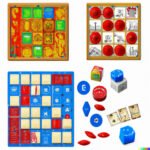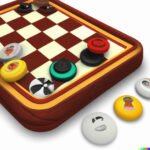Introduction
As a useful tool for learning, board games for middle schoolers offer countless educational benefits. Aside from reinforcing academic principles, group interaction and strategy-focused activities can help develop social and problem-solving skills. Providing an alternative to traditional physical or virtual gaming, middle school board games can act as guides to students’ cognitive development while they have fun.
Board games tailored to teach core subjects such as math and science, play a pivotal role in memorizing key concepts. An activity that requires players to move their pieces around a board according to their numerical values or solve equations provides a unique way of understanding basic arithmetic rules. Moreover, teaming up with other players to strategize ways on how to make smarter moves assists in the retention of fundamental scientific principles such as Newton’s Laws of Motion or the law of conservation of energy.
Additionally, mastering the rules and strategies associated with specific board games builds character by teaching children about perseverance and teamwork. While preserving fair play is essential for maintaining both short-term alliances and long-lasting friendships, adhering to rules designed earlier in the game demonstrates steadfastness under stress or difficult decisions; making this a highly effective skill set in any context that requires collaboration between multiple players. Furthermore, group discussion on strategic approaches encourages critical thinking with different ways to solve problems ” ultimately boosting problem-solving abilities.
Thoughts from middle schoolers themselves are just as important as those mentioned above: playing board games allows for quality time both amongst friends and family members – leading to improved communication among peers within groups; strongly building bonds over shared interests since everyone competes together against common obstacles on their individual paths to success during game play.
Nurturing Creative Thinking Through Games
Middle school board games are an excellent way to nurture creative thinking and problem-solving skills in students. They provide a platform for open-ended learning, which introduces students to concepts that may be challenging to understand within other teaching formats. Working on their own or as part of small groups, middle schoolers can identify patterns that link objects or ideas together as they work towards understanding a game’s rules and objectives. This encourages problem-solving skills, helping to build an ability to think outside of the box and effectively access new ideas.
In addition, board games help teach students to evaluate probabilities and manage risk. As they use trial and error to come up against obstacles while playing specific games, they learn how different factors can affect their decisions by learning how the outcomes of certain actions may differ between one game and another. The ability to assess various possibilities is a useful skill that may benefit them in further education or their future professional lives.
Moreover, many middle school board games were designed with educational principles in mind; they require strategizing and allow players the opportunity to use visual reasoning while giving them tools to comprehend complex theories, models and concepts more quickly. From simple number puzzles, to math-based trivia challenges or abstract strategy games requiring deeper knowledge involvements ” these titles offer simple but sophisticated methods of developing higher-order critical thinking skills amongst all age groups.
Boosting Problem-Solving Abilities with Board Games
Board games are a great way for middle school students to develop important cognitive problem-solving abilities. As students work their way through each game, their need to think critically and make strategic decisions will be sharpened. Board games typically have rules that teach math, logic and strategy as each player attempts to either advance towards a goal or block their opponents from advancing. This means that players are often doing more than just trying to win ” they’re honing their ability to think through puzzles and come up with creative solutions.
Playing board games helps students grow in tactical wisdom by learning how to forecast outcomes, take advantage of opportunities as they arise and anticipate the moves of opponents. Additionally, playing board games encourages collaboration and forces interaction within an environment where everyone is on an equal playing field without a reliance on physicality or skill level. Consequently, group dynamics such as fairness play a role in the criteria for any given game’s victory. Through this experience, middle schoolers learn the vital life lessons of respecting diversity and working together ” often while exceling at their cognitive skillsets simultaneously!
Strengthening Social Skills with Board Games
Middle school board games can be a great way to teach children important social and emotional skills. Board games promote problem-solving, critical thinking, and effective communication among team members. They can also help students learn about making decisions, predicting outcomes of certain situations, and resolving conflicts. Some of the most popular middle school board games are Battleship, Monopoly, Risk, and Catan. Each game offers unique ways to strengthen social skills in an engaging manner that is both fun and educational. For example, Battleship requires two players to strategize how they will hit the other player’s battleships while still protecting their own fleets. Monopoly teaches money management as each player purchases properties and tries to become the wealthiest player in the game. Meanwhile Risk encourages critical thinking by allowing players to successfully manage their armies so they can take over different countries on the game board. Finally, Catan involves resource gathering while competing against other players for resources and valuable land pieces. All of these middle school board games provide creative ways for students to work together as a team while honing valuable life skills like negotiation and compromising with peers.
Increasing Cognitive Memory With Fun Board Games
Middle school is an age where many students start developing an understanding of complex cognitive skills and strategies. Board games can be a great way to help enhance and build these types of skills in middle schoolers while they have fun. Games like chess, Settlers of Catan, Clue, Life and Stratego can help boost problem solving and reasoning while teaching strategic thinking. Additionally, cooperative board games such as Forbidden Island or Pandemic are excellent tools for helping children develop social competency, communication and collaboration to accomplish team goals. Not only do board games present a great opportunity for family bonding, but also for developing memory recall proficiency by cuing players to remember elements of the game such as dice rolls and move counts. Simple board games that only require two players like Checkers or Othello are great beginner builds for young minds and allow them to learn how following a few simple rules can give rise to sophisticated strategy.
Popular Middle School Board Games Today
Board games are a great way for middle schoolers to have fun with their friends and family. Many classic board games, such as Monopoly, Risk, or Clue remain as popular choices. There are also some newer, more modern board games, however, that are very entertaining and provide lots of challenges and interaction. Games such as Catan, Ticket to Ride, Gloomhaven, Terraforming Mars, Splendor and Pandemic all offer exciting game play designed to appeal to an older demographic. These games ultimately require strategy or innovative tactics in order to win the game. Board games can provide educational value by teaching patterns of logic and critical thinking skills in a fun way. Also, depending on the game is chosen it can provide an opportunity for teamwork building through verbal dialogue and brainstorming sessions. Overall board games make for an enjoyable time among friends or family members that encourages strategizing with a bit of competition combined with friendly banter.
Classic Middle School Board Games of the Past
The Middle school years have provided plenty of nostalgic memories for us all. Board games have been one of the most enjoyable pastimes during this time, providing hours on end of entertainment. Popular board games among Middle Schoolers include the classic game of Monopoly. This game requires you to accumulate and acquire as many properties as possible while also spending your money wisely in order to increase your net worth. Another classic board game is Clue, a mystery-solving game where players must use their detective skills and deduction to work out who was responsible for the dastardly crime that just occurred at a mansion. Other popular traditional board games fromMiddle School days include Pictionary, Exploding Kittens, and Sorry! The best part about these nostalgia inducing opportunities is that almost everyone has fond memories of them and still can play them with ease even if decades have gone by since they were first introduced.
Engaging Middle School Board Games for Modern Times
The middle school years are a time of exploration, growth, and play. Board games have been used for centuries to help children learn, develop their skills and socialize with friends. With the advancements in technology, there is a wide array of modern middle school board games that provide interactive experiences that build creativity and problem-solving skills. These board games can vary from traditional strategy and educational games to modern card and dice-based party games.
One type of popular middle school board game is the strategy game. This style of game encourages players to think critically and plan ahead while developing their decision-making skills. Examples of popular strategy middle school board games include Chess, Go (also known as Weiqi), Checkers, Dragon Mastery, Pandemic Legacy: Season 1, Arcadia Quest and Power Grid.
Another type of widely played middle school board game involves educational content learning such as science, math and geography. Many times these educational-style board games are designed so that the players become immersed in the subject matter”allowing them to have fun while also expanding their knowledge base. Examples of educational themed middle school board games include Elementos!, Lost Cities Expedition Treasure Hunt and Word on the Street Junior Edition.
Party style card or dice based middle school board games offer hours of entertainment; encouraging creativity in making up stories or silly jokes while building friendships amongst the players. Some popular examples include Exploding Kittens Card Game, Wits & Wagers Family Trivia Game Party Edition, Dungeon Master’s Keep – Dice Tower Defense Strategy Game as well as Telestrations ” The Award Winning Telephone Game Sketched Out! Ultimately each type of board game has a positive influence on childhood development”inspiring pleasant memories along with providing engaging learning activities for all ages.
Evaluating Options for Selecting the Right Middle School Board Game
The process of selecting the right middle school board game can be daunting. It is important to consider the age and maturity level of the players, as well as their individual interests. Game complexity should also be taken into account to ensure that the game presents a challenge without being too difficult for players or leading to boredom due to easy-to-master mechanics and rules. Additionally, selecting a game based on size is important since having multiple gaming pieces can become cumbersome and distracting for younger players. The availability of games for two or more players should also be explored to ensure an engaging experience for friends, siblings, and family members alike. Finally, reviewing reviews and ratings from trusted sources can help identify any potential problems with gameplay or components before making a final purchasing decision. Ultimately, when looking for middle school board game options it is best to approach it with an open mind in order to find one that suits the interests and needs of all of its players!
Conclusion
Middle school board games can unlock the academic potential of middle school students. Board games encourage active learning that stimulates motivation, critical thinking, and problem-solving skills. Through a mix of collaboration and competition, students gain socialization experience and hone their reasoning abilities. With access to a wide range of games built for different age groups, teachers are sure to find something to stimulate learning among middle schoolers.
Board games can provide the extra push middle school learners need in order to reach their academic potential. They allow for students to engage with curriculum materials in a fun and interesting way while developing thoughtful strategies, understanding concepts better and enhancing their emotional intelligence skills. Furthermore, they offer experiential learning free from screens that can be difficult to obtain especially during this pandemic era where digital technologies dominate most classroom practices. By leveraging on the fun aspect of these educational tools, teachers are able to create more positive traits in their pupils such as increased self-confidence and resilience when faced with challenges or projects ahead of them. This allows them to become independent thinkers with greater possibilities for success as they move along in their academic journey up until university level eventually.

I love playing all kinds of games – from classics like Monopoly to modern favourites like Ticket to Ride.
I created this blog as a way to share my love of board games with others, and provide information on the latest releases and news in the industry.





